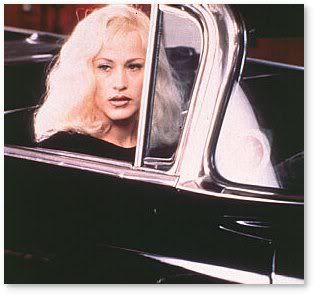
At last David Lynch's 1997 underrated masterpiece Lost Highway is available on dvd in widescreen format. Co-writing with Barry Gifford, Lynch blurs film history, psychological identity, and transgressive sexuality in this lush companion piece to Blue Velvet and Mulholland Dr., of which Lost Highway is the equal.
The lost highway of the title suggests a road movie, like Lynch's own Wild at Heart, but this is a metaphysical road movie--two actors (Bill Pullman and Balthazar Getty) inhabit one soul between them, while Patricia Arquette is split in two--one part Bettie Page brunette, one part Lana Turner blonde--too much pulchritude for just one character--as the two protagonists' ineluctable destination.
The lost highway may also be sexual impotence, schizoid disconnection from reality, or simply the loss of narrative linearity and subjective integrity.
Audiences and critics failed to warm up to this movie. Part of the reason may be Pullman and Getty, two uncharismatic actors who, even as leading men, approximate invisibility in any film they're in. Yet Lynch, in league with these two actors, exploits this characteristic to good effect here--like Hitchcock, who sometimes played off the blandness of his leading men (John Gavin, Robert Cummings, Farley Granger, and, arguably, James Stewart), counterpoints to all the weird and perverse elements of the milieu.
And Lost Highway has plenty of weird to offset the blandness--weird that is in no small part supplied by the likes of Robert Loggia, Gary Busey, Jack Nance, Michael Massee, Richard Pryor (at the saddest, frailest point of his too brief career), Henry Rollins, and ... Robert Blake, sans eyebrows, in Uncle Fester whiteface. And what could make a thriller about a wife-killer creepier than to feature Blake as the ubiquitous bête noire of Pullman/Getty ("We've met before, haven't we?")
Arquette has never been sexier than in this film. It's hard to make a thriller with one actress playing both blonde and brunette without invoking Hitchcock's Vertigo. The hommage is there, to be sure, but Arquette's Alice/Renee embodies eroticism, vulnerable yet commanding, whether dressed in a long, dark brown sheath dress, or a shiny gold dress with straps and a plunging neckline. And Lynch's camera loves to show us Arquette slipping out of her clothes--in several cinematic stripteases, any one of which rivals Kubrick's famous opening shot of Nicole Kidman in Eyes Wide Shut.
Lost Highway also boasts the best soundtrack of any of Lynch's films--with contributions from Trent Reznor, Marilyn Manson, David Bowie, and Lou Reed. And Angelo Badalamenti's score here is richly romantic, to offset the aural vacuum and J-horror creep effects that Lynch has explored since his first feature, Eraserhead.
Of course, audiences are often put off by Lynch's reluctance to adhere to a straight course--no characters with whom to comfortably relate, no simple cause and effect, no moral center, tenuous motives, elliptical and self-consuming story lines.
Lost Highway has all this, and then some.
In addition to the inexplicable switches and divisions of identity already mentioned, day turns into night, without warning. Exterior blends into interior. Arrival points turn into points of departure. Characters manage to be in two places at once in some scenes; in other scenes they are not present at all, though plainly visible to the audience.
But when a film has this much texture, it doesn't need a coherent plot. The film's realism is the realism of dreaming, and watching it, I am endlessly fascinated with both its distortions and its precise, hopeless eye for detail.
No comments:
Post a Comment